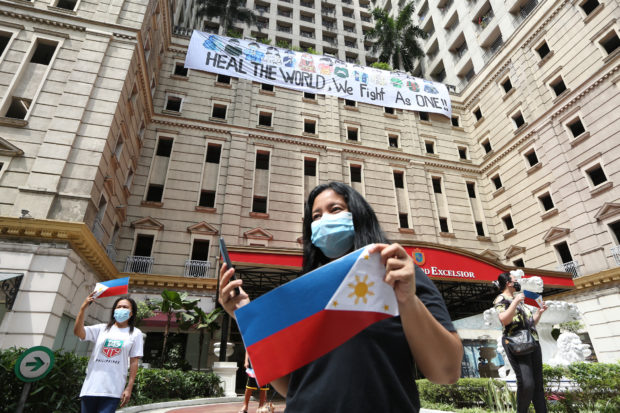Task force: Virus cases to be identified to speed up contact tracing

GRATITUDE A resident of Eastwood City shows support for medical front-liners on Easter Sunday. (Photo by NIÑO JESUS ORBETA / Philippine Daily Inquirer)
MANILA, Philippines — The government will now disclose the identities of confirmed COVID-19 cases to speed up the tracing of the patients’ contacts and their treatment in a bid to halt the spread of the new coronavirus that causes the deadly disease.
Cabinet Secretary Karlo Nograles on Sunday said the Inter-Agency Task Force on Emerging Infectious Diseases had adopted a policy of “mandatory public disclosure” of the personal information of COVID-19 patients to enable the government to find all of their contacts and isolate them to stop the spread of the virus.
It is also expected that with the disclosure, the patients’ contacts will voluntarily come forward to be tested.
In the past weeks, the task force had to urge hospitals to seek the patients’ consent before disclosing their identities and condition.
Civil defense takes over
Nograles, the spokesperson for the task force, said the Office of Civil Defense was now in charge of finding the patients’ contacts, taking over the job from the Department of Health (DOH).
The DOH reported 50 new deaths from the coronavirus disease on Sunday, the deadliest day since the beginning of the local outbreak, bringing the toll to 297.
The health department also reported 220 new infections, pushing the nationwide total to 4,648, and 40 recoveries, raising the number of survivors to 197.
Health Undersecretary Maria Rosario Vergeire said the new deaths and recoveries included unreported cases and cases from the DOH backlog.
“We are catching up on our backlogs, having expanded our testing capacities,” Vergeire said in a video briefing.
She didn’t explain, however, whether the new cases were people who caught the coronavirus during the last 24 hours or backlog cases whose tests returned positive during the same period.
Without an explanation, it is unclear whether the virus is spreading or the DOH backlog is just yielding positive results.
Gov’t satisfied
But Nograles said the government was satisfied with the DOH handling of the health crisis.
“So far, we are satisfied with the performance [of the] DOH. To put it in context, look at other countries and you will be surprised at how many COVID-19 positives and deaths they have,” he said. “Other richer nations are really struggling. If you compare our situation, their level is different from ours. So we are doing everything [we] can.”
The task force also warned the public against “experimenting” with drugs touted as a cure for COVID-19.
“If it is not approved by the Food and Drug Administration (FDA) and the Department of Health, do not experiment with [it, as its] efficacy [is] unknown,” Nograles said.
“I’m not a doctor, and I don’t have the expertise. But this [is] the call of the DOH. If it’s not an approved drug, do not take risks or experiment with it,” he added.
The warning came amid calls on social media for the government to consider unlicensed an unapproved drugs for treating COVID-19, such as Prodex and the Fabunan antiviral injections.
The FDA has said there are no applications for the registration of these drugs and that these cannot make therapeutic claims or be sold to the public.
According to the FDA, clinical trials are going on to test the efficacy and safety of existing medicines such as antiviral, antibacterial and antimalarial agents in treating COVID-19.
Rapid testing kits
Nograles also said the DOH had been directed to issue updated guidelines on the use of rapid test kits in the Philippines.
The FDA has approved 32 COVID-19 real-time polymerase chain reaction test kits for commercial use, including the first Philippine-made test kit for the new coronavirus.
GenAmplify, the rapid test kit developed by a University of the Philippines scientist, costs P1,320 or about a quarter of the price of imported testing kits. Its FDA approval came in time with the government’s rapid contact tracing.
Raul Destura of the UP National Institutes of Health (NIH), however, has proposed “pooled” testing for every household as an alternative to mass testing.
“If you want to test vulnerable communities to determine how big the cases of infection in [those] communities are, you don’t need to test everyone. For example, if there four members in one household, we collect sample[s] from all four. All of those swabs are placed in one viral transport container and it is held as one test,” Destura said in an interview with the Inquirer.
“If it comes out positive, it means one or all of them may be [have been] exposed. They are living in one house, which means they have exposed each other [to the virus], so there’s no point in discriminating. All of them must come under monitoring, even the asymptomatic ones,” he said.
Destura is the founder of Manila HealthTek, maker of GenAmplify. Currently, the company produces 10,000 testing kits a day. It will soon expand that capacity to 16,000 kits.
—WITH REPORTS FROM TINA G. SANTOS AND DORIS DUMLAO-ABADILLA
For more news about the novel coronavirus click here.
What you need to know about Coronavirus.
For more information on COVID-19, call the DOH Hotline: (02) 86517800 local 1149/1150.
The Inquirer Foundation supports our healthcare frontliners and is still accepting cash donations to be deposited at Banco de Oro (BDO) current account #007960018860 or donate through PayMaya using this link.